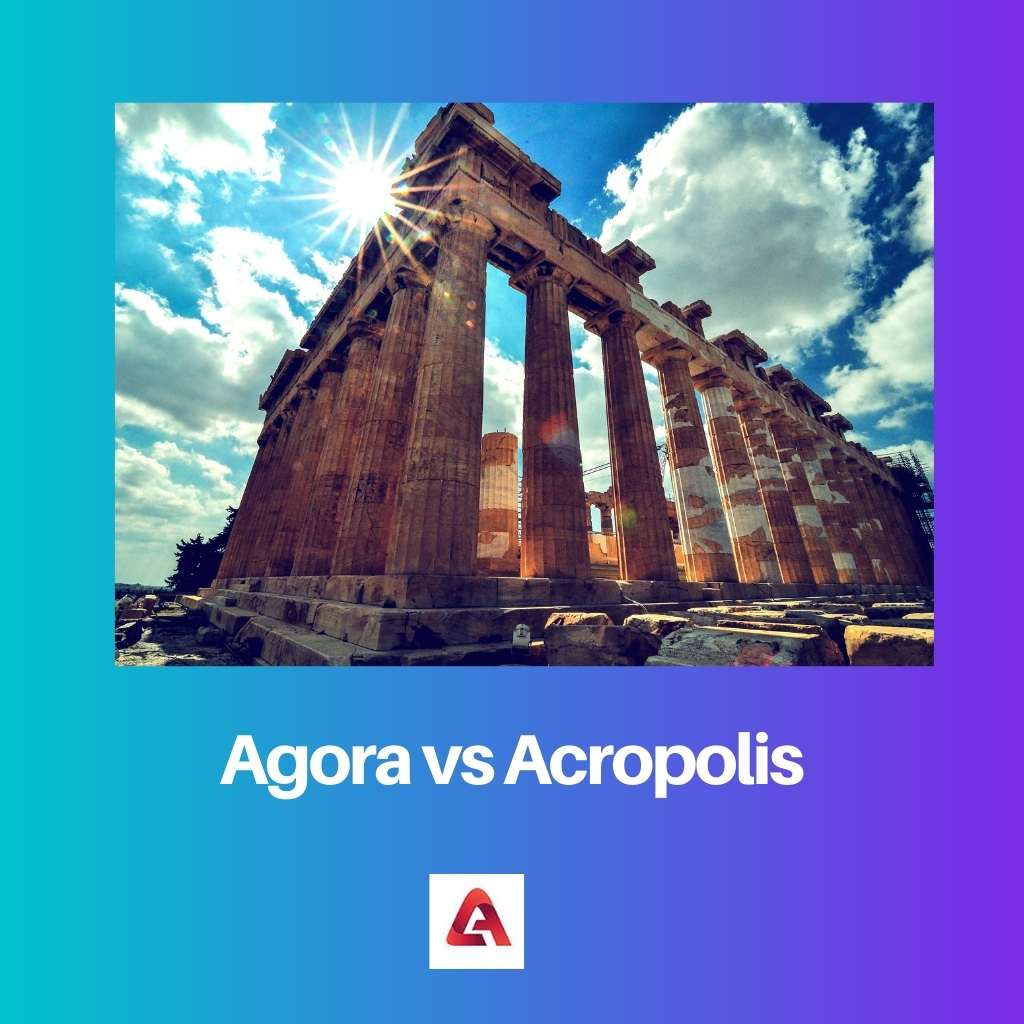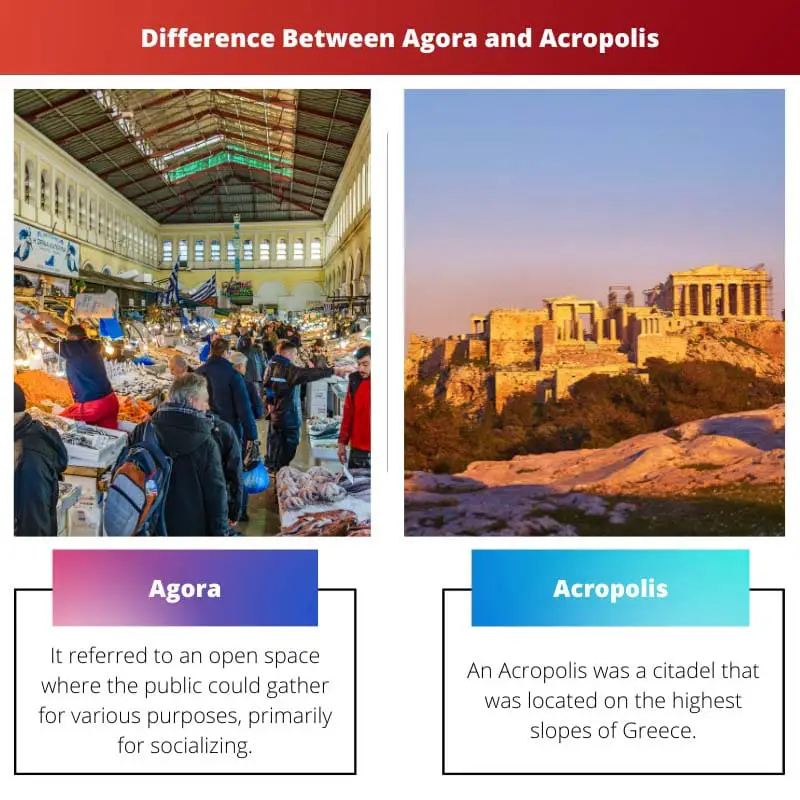Agora and Acropolis are two terms that were extensively used in the ancient Greek civilization. Both of them were used to refer to a certain place that had a designated purpose.
Their usage decreased over time as the civilizations went through many changes such as modernization. However, they have many notable differences between them.
Key Takeaways
- The Agora served as a central marketplace and social hub in ancient Greek city-states, while the Acropolis functioned as a fortified citadel and religious center.
- The Agora primarily focused on commerce, politics, and everyday life, whereas the Acropolis centered around religious and military activities.
- The Acropolis featured various temples, such as the Parthenon, dedicated to Greek gods, whereas the Agora housed numerous buildings, including the Stoa and the Tholos, for administrative and public purposes.
Agora vs Acropolis
The difference between Agora and Acropolis is that ‘Agora’ was a center in which people gathered to have various discussions about philosophy, politics, etc. and also to carry out commercial activities whereas ‘Acropolis’ was a specified place in which people gathered to carry out certain rituals, ceremonies, and other similar practices.

Agora was essentially an open space that acted as a ‘hub’. Here, the public could carry out several activities that enhanced their social life.
They could gather for debates and discussions about various matters of their choice. The pace even included markets in which trading was carried out by farmers, artisans, and others.
Meanwhile, Acropolis had a much more formal setting. It was a space used for processions, ceremonies, rituals, etc. It included religious centers, forts, and even residential areas for people of high status.
The place could essentially be looked at as a citadel that served as an important community center. Sometimes, an acropolis that was on a hilltop could be used as a position of defense.
Comparison Table
| Parameters of Comparison | Agora | Acropolis |
|---|---|---|
| Meaning | It translates to ‘a place of assembly’. | It translates to ‘highest point in a city’. |
| Nature | It has an informal setting. | It has a relatively formal setting. |
| Usage | It was a place for socializing. | It was a place for carrying out processions. |
| Activities | Discussions, debates, and even commercial trade took place here. | It included religious centers, forts, and even residential areas. |
| Example | An example is the ancient Agora of Athens. | An example is the Acropolis of Athens. |
What is Agora?
Agora is an ancient Greek word that translates to ‘a place of assembly’ in English. As this suggests, it referred to an open space where the public could gather for various purposes, primarily for socializing.
They could conduct discussions and debates about various topics of philosophy, politics, business, and other concepts.
In the initial phases, an agora acted as a way for the state to accommodate public life. Citizens would gather to be informed about various rulings or statements issued by the king or council.
Military duties would also be carried out on several occasions. Later, owing to the involvement of people, the area also accommodated market spaces where people could carry out commercial activities.
The location of Agora in Greece was beneath the northern slopes that served as an Acropolis. This was at the center of the city, which made it accessible for people living in different parts of it.
Some Agoras were even located near harbors, which allowed people to have stunning views. This also helped fishers to trade their catches by putting up shops or stalls.
The structure of an Agora included a long sequence of columns. These could be free-standing or even connected to buildings.
Together, they formed corridors that allowed people to have long strolls on them. The entire space also included decorative items such as trees, fountains, and statues.

What is Acropolis?
The term ‘Acropolis’ is a Greek word that translates to ‘highest point in a city’ in English. As this suggests, an Acropolis was a citadel that was located on the highest slopes of Greece.
It had a relatively formal setting as compared to Agora. The place was dedicated to religious processions that included various ceremonies, rituals, and other practices.
The space even served as a residential complex for people who had a high status in society. It included several religious centers that would be open only to these people.
There were also many forts built in the vicinity. These acted as defensive positions for the military in times of crisis.
In Greece, there were several Acropolises built in different cities. One of the most famous ones in the present day is the ancient Acropolis of Athens.
This was located on the peak of the northern slopes. It was a fortified area that made it somewhat exclusive.
Many royal personalities also resided here.
Interestingly, the Acropolis held major significance when the ancient Olympics took place. During the event, a procession was carried out which involved traveling through the city.
It ended at the Acropolis. Further, several ceremonies would be carried out at this place.

Main Differences Between Agora and Acropolis
- Agora translates to ‘a place of assembly’ whereas Acropolis translates to ‘highest point in a city’.
- Agora has an informal setting whereas Acropolis has a relatively formal setting.
- Agora was a place for socializing whereas Acropolis was a place for carrying out processions.
- Activities including discussions, debates, and even commercial trade took place at agora whereas religious ceremonies, rituals, and other events took place at Acropolis.
- An example of the agora is the ancient Agora of Athens whereas an example of Acropolis is the Acropolis of Athens.

- https://www.emerald.com/insight/content/doi/10.1108/10748121011082662/full/html
- https://muse.jhu.edu/article/652712/summary

The comparison table is extremely useful to understand the differences between Agora and Acropolis.
The understanding of the social and political functions of these two places is crucial to comprehend the organization of ancient Greek life.
The historical significance of both Agora and Acropolis are fascinating, it’s interesting to see how they shaped ancient Greek society.
Understanding the difference between Agora and Acropolis is crucial to understand the ancient Greek civilization.
The author did a great job at explaining the architectural structure of both Agora and Acropolis.
This article helps to understand the historical context of Agora and Acropolis. Especially it’s interesting how they evolved over time.